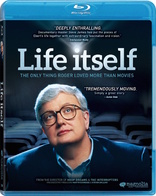Life Itself Blu-ray Movie
HomeLife Itself Blu-ray Movie 
Magnolia Pictures | 2014 | 121 min | Rated R | Feb 17, 2015Movie rating
7.8 | / 10 |
Blu-ray rating
| Users | 0.0 | |
| Reviewer | 4.0 | |
| Overall | 4.0 |
Overview
Life Itself (2014)
In 2013, we lost Roger Ebert, arguably the nation's most influential and popular film critic. Based on his memoir of the same name, Life Itself recounts Ebert's fascinating and flawed journey from politicized school newspaperman to Chicago Sun-Times movie critic to Pulitzer Prize winner to television household name. Along the way, he tries to overcome his alcoholism and finds lasting love relatively late in life.
Starring: Roger Ebert, Martin Scorsese, Werner Herzog, Errol Morris, Ramin BahraniDirector: Steve James (II)
| Documentary | Uncertain |
| Biography | Uncertain |
Specifications
Video
Video codec: MPEG-4 AVC
Video resolution: 1080p
Aspect ratio: 1.78:1
Original aspect ratio: 1.85:1
Audio
English: DTS-HD Master Audio 5.1 (48kHz, 24-bit)
Subtitles
English SDH, French, Spanish
Discs
50GB Blu-ray Disc
Single disc (1 BD)
BD-Live
Playback
Region A (locked)
Review
Rating summary
| Movie | 4.5 | |
| Video | 4.5 | |
| Audio | 3.5 | |
| Extras | 3.0 | |
| Overall | 4.0 |
Life Itself Blu-ray Movie Review
The People's Critic
Reviewed by Michael Reuben February 14, 2015Reviewing the biographical documentary Life Itself is a humbling experience, because one is constantly confronted with the voluminous and distinctive writings of the most famous reviewer in film history, the late Roger Ebert. Ebert's memoir of the same title is the basis for Steve James's film, which he began four months before Ebert passed away on April 4, 2013, following a long battle with cancer. Selections from Ebert's frank and lively memoir are heard in voiceover throughout the film, read by Stephen Stanton (who is a good enough vocal double for Ebert to have imitated him for Adult Swim's Robot Chicken). The writer's own voice was silenced by illness in 2006, but he is heard throughout the film in clips from his long and prolific career. James and Ebert had known each other for years. In 1994, Ebert and his famous on-air rival, Gene Siskel, had hauled the director's first film, Hoop Dreams, from obscurity and become its tireless advocates. (Criterion will release the film on Blu-ray this March.) Most recently, Ebert had praised James's documentary for Frontline, The Interrupters, about street violence in Chicago. The original plan for Life Itself was to record the active schedule that Ebert had managed to maintain despite his illness: attending screenings, writing reviews, posting daily updates to his blog, entertaining his massive Twitter following, hosting dinner parties with wife Chaz. Just before filming began, however, Ebert was diagnosed with a hip fracture that required months of rehabilitation and ultimately led to the diagnosis of new cancer. Life Itself became both a celebration of Ebert's life and a chronicle of his final days.
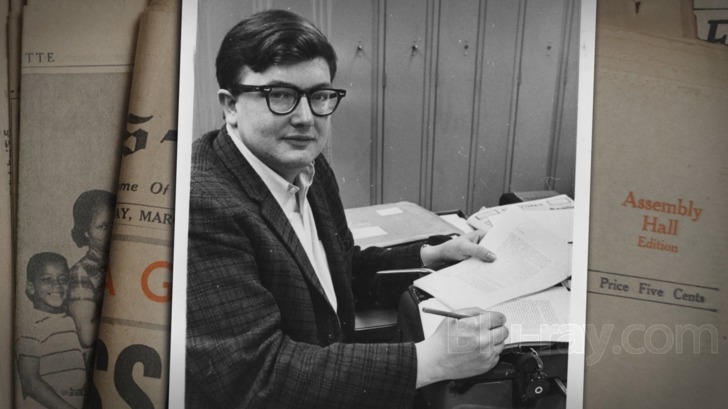
It would be hard to overstate Ebert's impact on film viewing. Even people who never watched the original Sneak Previews with Siskel and Ebert, or any of its subsequent incarnations, or At the Movies with Ebert & Roeper, the reinvention of that show following Siskel's death in 1999, discuss films today in a style that Ebert was largely responsible for creating. New York-based Pauline Kael and Andrew Sarris were among the first American critics to treat cinema as a serious art form, but it was Ebert and his Chicago-based partners who truly embraced the populist nature of the movies, talking about them in an approachable manner and encouraging everyone to join the dialogue. An early adopter of home theater, an enthusiastic user of the internet and social media, Ebert believed that movies were a crucial medium for sharing all aspects of the human experience. The bigger the audience, the better. He did not go unchallenged among his colleagues. Critic Richard Corliss, one of Life Itself's many interviewees, reads from a 1991 article in which he attacked the "thumbs up, thumbs down" formula of Siskel & Ebert for trivializing film appreciation. Ebert himself conceded that the TV review format did not permit in-depth analysis. He much preferred the opportunities presented by a DVD commentary or by his yearly appearances at the Conference on World Affairs in Boulder, Colorado, where he would show a film of his choice (for example, Citizen Kane), then offer sessions for the next four days in which he would provide a shot-by-shot analysis, taking questions and comments from the audience and speaking extemporaneously for as long as five hours at a time. In a preview of some of the dissenting internet comments posted when Ebert died, an audience member once asked, "Who do you think you are that you get to have all these opinions?" To which Ebert replied: "First, Marshall Field, who owns the Chicago Sun-Times, appointed me as its film critic. And second, would you want to listen to you?" The comment about being hired for the Sun-Times underlines a crucial point about the evolution of film criticism. As is sometimes noted, today anyone can record themselves with a cell phone camera, post the results on YouTube, and call themselves a "critic". In Ebert's era, you had to know how to write—clearly, concisely and on deadline. One of the best parts of Life Itself, especially for those who only know Ebert from his later career when he was well-established, is its account of his early years. Ebert was a talented and polished writer from an early age, publishing his own local newspaper as a teenager in Urbana, Illinois, editing The Daily Illini at the University of Illinois at Urbana, reporting for The News-Gazette of Champaign-Urbana, and eventually moving to Chicago, where he began working at the Sun-Times. It was the Sun-Times that first made him a film critic in 1967, and he remained stubbornly loyal to that institution through good times and bad, refusing lucrative offers from bigger names after he himself had become one of the biggest names in Chicago journalism. But with the life of a reporter came side effects. Life Itself provides a frank account Ebert's heavy drinking, much of it in a seedy bar near Chicago's "Old Town", where the columnist and his fellow newspapermen hung out until all hours of the night. In 1979, Ebert experienced his "moment of clarity", joined AA and gave up alcohol for good. By that point, he had already begun the contentious TV partnership with Gene Siskel through which both of them would become world famous. Sneak Previews began on Chicago's PBS station in 1975 (initially called "Opening Soon at a Theater Near You"), and Life Itself includes some revealing outtakes capturing just how petty and angry the sniping between the two competing reviewers could become. The rivalry grew into a unique friendship as the pair became permanently linked in the mind of an ever-expanding public. As their producer explains, only the New York and Los Angeles markets resisted the Siskel & Ebert show, because how dare these two guys from Chicago opine about movies? Eventually, though, the battling Second City duo became so popular that even the snooty coasts had to cave in and air the show, to the great satisfaction of the entire Siskel & Ebert team. Throughout Life Itself, James keeps coming back to Ebert struggling through rehab in 2013, very much changed physically, speaking only through written notes or an electronic voice and relying on aides and his devoted wife for basic necessities. Depending on one's age, experience and personal orientation, these portions of the film may be hard to watch or they may be encouraging (probably a mixture of the two), because the man's passion for life and work is astonishing. The same mind that had argued so intensively with Siskel remained alert and focused until the end, and Ebert continued watching films and writing about them for as long as he was able to do so. (His final Sun-Times review, of Terence Malick's To the Wonder, appeared on April 6, 2013, two days after he died; other reviews from his final days have since appeared at his website.) He visited with family and friends. He wrote blog entries, including the famous "leave of presence" post on April 2, 2013. He remained what Roger Ebert had always been first and foremost: a writer who loved films.
Life Itself Blu-ray Movie, Video Quality 
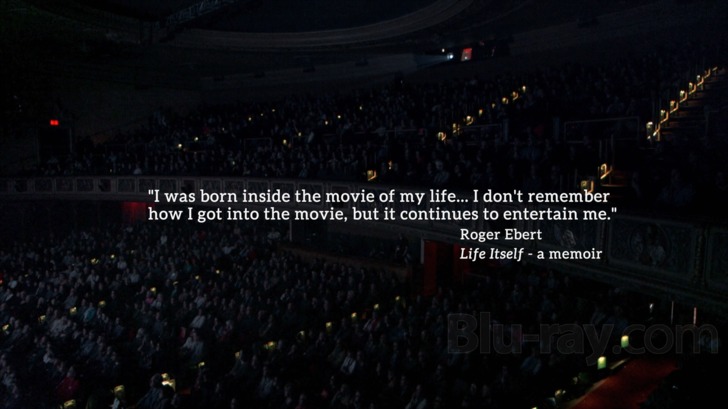
Life Itself was assembled from an array of sources, including photographs, film, old VHS recordings, news reports and interviews and other footage specifically shot for the film in HD video. Dana Kupper, who worked with director James on The Interrupters, is the credited cinematographer, but James is shown early in the film holding the camera, when Ebert playfully instructs him to shoot his own reflection in the mirror. The disparate sources were scanned and edited together digitally, and Magnolia Home Entertainment's 1080p, AVC-encoded Blu-ray has presumably been derived directly from digital files. The video quality varies depending on the source, with the HD-originated sources and the scanned still photographs looking the best. The detail, clarity and densities of those portions of the film look very good, with no distortions or flaws, save for any that were there to begin with. Older recordings, especially clips and outtakes from Siskel & Ebert, reflect the limitations of their standard-definition sources, but they look about as good as one could expect. Colors run the gamut from realistic in the contemporary scenes to washed out in some of the older segments. (They are strong enough, however, to show off the frequently unstylish wardrobe favored by both Siskel and Ebert. As their producer says, part of their appeal was that they didn't look like traditional TV personalities, but more like people with whom viewers could imagine discussing a film.) Banding, aliasing and other artifacts not otherwise present in the source material were not an issue. Magnolia has mastered the film at a relatively high rate, for a digital production with a large number of talking-head scenes, of 27.90 Mbps.
Life Itself Blu-ray Movie, Audio Quality 
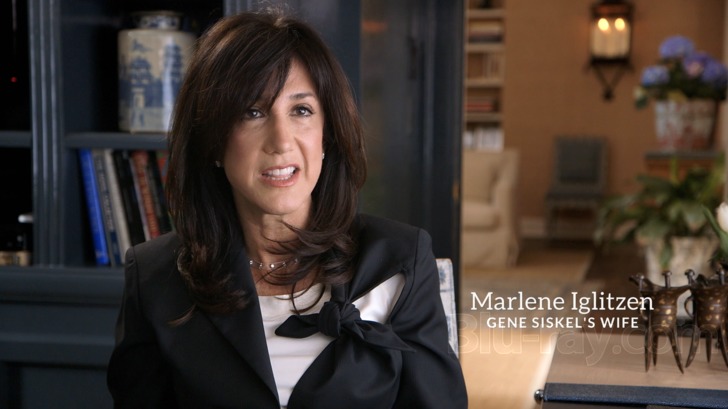
The 5.1 soundtrack for Life Itself, encoded in lossless DTS-HD MA, is a simple and straightforward affair, with voices planted firmly in the front center channel and an unobtrusive musical score by Joshua Abrams (The Interrupters) filling up the rest of the speaker array. The voices are clear, and the score accomplishes its purpose.
Life Itself Blu-ray Movie, Special Features and Extras 
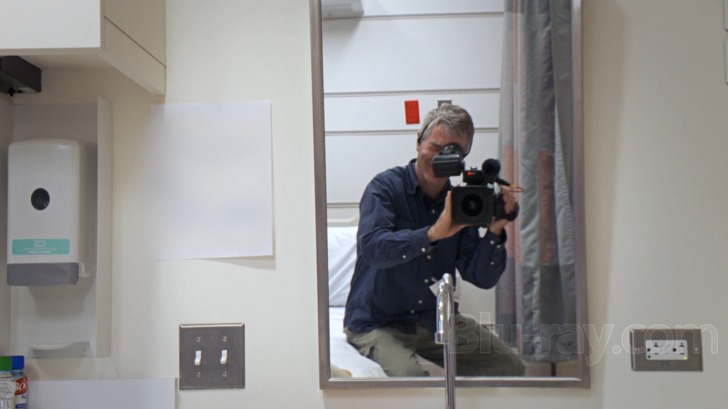
- Deleted Scenes (1080p; 1.78:1; 22:23): These scenes are not color-corrected or finalized, and it's easy to see why they were deleted. They either repeat points already adequately covered or digress too far from the film's narrative. But many contain memorable and entertaining vignettes. High points are the launch of the redesigned Ebert website, shortly after his death, and a long and elaborate story (no doubt exaggerated for dramatic effect) about a bet between Ebert and friend John McHugh that Ebert could order two Johnnie Walkers anywhere in the world, despite speaking no language other than English.
- Ebertfest
- Gene Under the Table
- Mr. Limericks
- Ina and Roger
- Young Writers
- Roger's First Article in Chicago
- Film Lessons
- Chaz and Roger's First Date
- Hoffman Nurse
- Rob Schneider
- Blogging
- Encouragment for Recovery
- Website Launch
- Reciting T.S. Eliot
- Johnnie Walker
- Sundance Tribute (1080p; 1.78:1; 6:54): This tribute was made on the occasion of Ebert's posthumous receipt of the Sundance Vanguard Award in June 2013. Errol Morris, Steve James, Ramin Bahrani, Gregory Nava and Werner Herzog talk about Ebert and his help and influence. Substantial portions of this tribute have been incorporated into Life Itself.
- Interview with Director Steve James (1080p; 1.78:1; 10:41): Looking directly into the camera, James interviews himself. Sincere as he is, James demonstrates that some people are more eloquent with images than words.
- AXS TV: A Look at Life Itself (1080p; 1.78:1; 2:22): This typical AXS TV promo has been created by combining excerpts from the James interview, plus snippets from an interview with Chaz Ebert, with portions of the film's theatrical trailer.
- Theatrical Trailer (1080p; 2.39:1; 2:22).
- Also from Magnolia Home Entertainment: The disc includes trailers for Serena, The Two Faces of January, Force Majeure and Ballet 422, as well as promos for the Chideo web service and AXS TV. These also play at startup, where they can be skipped with the chapter forward button.
- BD-Live: As of this writing, attempting to access BD-Live gave the message "Check back later for updates".
Life Itself Blu-ray Movie, Overall Score and Recommendation 
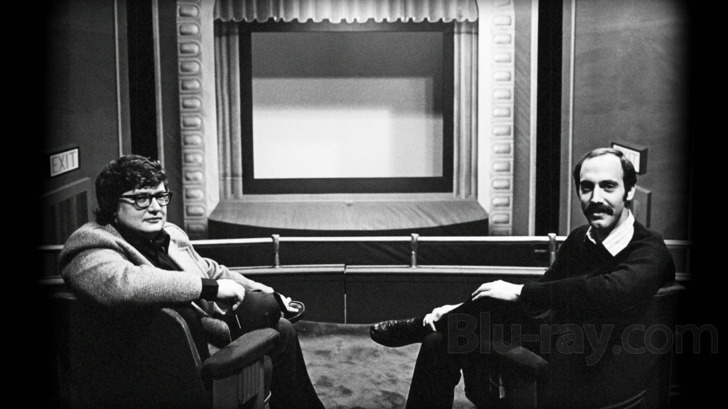
Ebert's works include a novel, a screenplay (for Russ Meyer's Beyond the Valley of the Dolls), a history of the University of Illinois, a tour guide of London, a memoir of the 1987 Cannes Film Festival (and the previous twelve) and, of course, multiple volumes of collected reviews, essays and interviews. All of his movie reviews can now be found online at the redesigned website launched shortly after his death (the launch is depicted in one of Life Itself's deleted scenes). While it may be true that anyone with a cell phone and an internet connection can call themselves a critic, it takes a lot more to actually be one. It will be a long time (if ever) before we encounter one of Ebert's caliber. He combined great intelligence, a sharp wit, the discipline of a professional writer, the scholarship of having watched hundreds of movies and thought about what made them work (or not), the challenge of debating an equally talented adversary and the devotion and enthusiasm to keep doing it day after day, year after year, even when his health was failing and death was knocking at the door. Above all, Ebert was passionately committed to the notion that movies matter, not because they make the critic important, but because they make other people important. Movies, he said, are a machine for creating empathy. Add Life Itself to that list. Highly recommended.
Similar titles
Similar titles you might also like

De Palma
2015

RBG
2018

Won't You Be My Neighbor?
2018

The Front Runner
2018

Minding the Gap
2018

Always Shine
2016

Best of Enemies
2015

A Beautiful Day in the Neighborhood
2019

On the Basis of Sex
2018

All Eyez on Me
2017

Closet Monster
2015

Hitchcock/Truffaut
2015

Cameraperson
2016

A LEGO Brickumentary
2014

I Am Chris Farley
2015

The Great Buster: A Celebration
2018

Waiting for "Superman"
2010

Trust
2010

The Goldfinch
2019

David Lynch: The Art Life
2016
